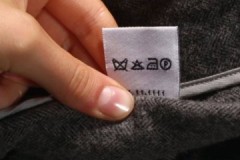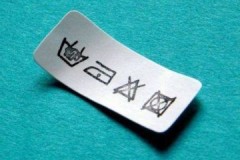Useful life hacks on how to remove deodorant stains from clothes
 Deodorants are body care products that combat sweating and unpleasant odor under the arms.
Deodorants are body care products that combat sweating and unpleasant odor under the arms.
The nuances of using antiperspirants include frequent cases of clothes getting dirty on the inside, white or yellow.
In most cases, it is very difficult to remove such marks. Simple recipes and special household chemicals will come to the rescue.
We'll tell you how to remove deodorant stains in this article.
Content
How to remove using folk remedies?
To remove deodorant stains, products that are already in the household can be successfully used. They are no less effective than store-bought ones, especially when it comes to fresh marks.
White
 Turning the item inside out, you can often notice white spots under your hands. Their appearance is associated with the composition of the deodorants themselves:
Turning the item inside out, you can often notice white spots under your hands. Their appearance is associated with the composition of the deodorants themselves:
- aluminum salts - to block sweating;
- talc - to absorb sweat.
When dry, both talc and aluminum form white spots. The darker and brighter the item, the more noticeable these marks will be.
If white spots were noticed immediately, it will be relatively easy to wash them off. Regular detergents will work. They are applied in concentrated form to the stained areas and the material is rubbed.Next, the item is soaked for the detergent to take effect.
If you didn’t start removing traces of deodorant right away, it’s better to treat the stains more thoroughly. Marks will need to be marked before washing. process with one of the available options:
- dish soap;
- vinegar;
- alcohol (vodka).
Alcohol
For processing you will need regular vodka or alcohol from a pharmacy, which is diluted in half with water. To treat the stain, you can pour vodka directly from the bottle or rub the mark with a sponge soaked in an alcohol solution.
For difficult (old, dried) stains, it is better to leave the item to sit for half an hour to an hour. Completes the care by washing in the usual way..
Dish gel
Dishwashing liquid can be used to remove white deodorant stains.
 Procedure:
Procedure:
- Wet a napkin or sponge.
- Squeeze out the water.
- Apply a little dish gel to a napkin.
- Treat the stain with rubbing movements.
- Leave to act for an hour, making sure that the treated area does not dry out.
- Wash the product.
Vinegar
You can treat with table vinegar not only on cotton, but also on woolen items. The product is suitable for colored clothes.
Stains are removed using the following algorithm:
- Moisten the stained area with vinegar.
- Leave the item for 10 minutes.
- Wash the product.
For old marks, the exposure time to vinegar can be increased to several hours.
Yellow
Yellow stains on things near the armpits are formed as a result of mixing sweat with deodorant.
Remove such contaminants efficiently The following medications will help:
- ammonia;
- hydrogen peroxide;
- lemon juice;
- soda;
- aspirin.
Yellow deodorant stains are most noticeable on white and light-colored clothing.
Aspirin
Aspirin tablets contain acetylsalicylic acid. Using this medicine, even stubborn marks can be removed.
 Application procedure:
Application procedure:
- Grind 2-3 aspirin tablets into powder.
- Dissolve the powder in ? glasses of water.
- Apply the solution.
- Rub the area with the mark with a brush.
- Just leave the item to lie there for 2 hours.
- Rub the area that was treated.
- Wash the product.
Ammonia
To treat stains, it is recommended to use a pharmaceutical ammonia solution. When working with this product, it is necessary to take into account the strong specific smell of the drug and organize good ventilation.
For processing you will need to make a solution:
- pour 1 glass of warm water into the prepared container;
- pour in 1 tsp. ammonia;
- stir the solution.
Use a napkin or brush to rub the resulting solution onto the stained area. In this form, the item is left for a quarter of an hour to work, and then washed.
Hydrogen peroxide
Pharmacy peroxide can be used as a stain remover.
The application is quite simple:
- Apply the product directly from the bottle to the area with a trace of deodorant.
- Leave for 2 hours.
- Wash the item.
If the item is small in size, it can be soaked entirely in the solution.The proportion in this case should be as follows: for 1 liter of water – 1 tbsp. peroxide.
Lemon juice
Natural lemon juice can be used as a stain remover. It is applied to the stain and left for several minutes to act.
 Alternative use:
Alternative use:
- squeeze juice onto the deodorant mark;
- sprinkle the marks on top with salt;
- rub;
- after the trace of deodorant has begun to disappear, rinse and then wash the item.
If the stains are old, applying lemon juice will not be effective.
Soda
To remove yellow deodorant marks You can use baking soda:
- Pour into a prepared wide container? a glass of soda.
- Pour in 4 tbsp. water.
- Stir thoroughly.
- Apply the product to the stains.
- Leave the item to sit until the powder dries.
- Clean off any remaining mixture from the surface of the fabric.
- Wash the product.
Special preparations
Stain removers are used to treat deodorant stains. They are applied to the affected area of the item and kept according to the instructions.
Liquid stain removers from TM HG and Dr. Beckmann have proven themselves to be effective against traces of sweat and deodorant.
Dr. Beckmann
Dr. Beckmann Rust and Deodorant Gel Stain Remover will help deal with deodorant stains. The product is highly effective against fresh and old marks. At the same time, there is no aggressive effect on the fabric.
The stain remover does not contain chlorine, phosphates or fragrance. Dr.Beckmann is suitable for processing white and colored fabrics.The product is used undiluted - directly on the contamination.
How to use:
- for items that cannot be washed, the exposure time should be no more than an hour;
- for items that will be washed – 2 hours.
During exposure, the fabric should not dry out. The average price is 200 rubles per bottle.

Stain remover HG
The drug is available in the form of a spray, designed for the care of synthetic and cotton items. The stain remover copes even with stubborn stains that have become old.
HG is intended for pre-treatment of items, used before washing. The product is suitable for clothes of any color. Contains no chlorine.
Price - about 450 rubles per bottle with a spray bottle.

Soap Antipyatin
The soap is designed to effectively remove a wide range of stains from fabrics. The product works effectively even in non-hot water thanks to a complex of enzymes in the composition.
Antipyatin can be used for comprehensive care of clothes for adults and children. The item is lathered in the area where it is dirty, left to sit and then washed.
The average cost is about 50 rubles.

Features of removing marks depending on the type of fabric
When starting to remove any stains, including those from deodorant, it is necessary to take into account the composition of the fabric. This is important both when using store-bought products and when using home recipes.
Influence of fabric type on processing:
- It is not advisable to treat delicate materials with acids and acetone; the products used should be mild, for example, dish gel;
- polyester and other synthetics cannot be cleaned with gasoline;
- natural wool and silk and cannot be washed with acids and alkalis; it is better to use ammonia for treatment;
- Cotton and thick fabrics will withstand almost any home remedy.
In addition to the type of fabric, it is necessary to take into account its color and dye fastness.
Cleaning nuances depending on the color of the material
The color of the items from which stains need to be removed imposes a number of restrictions on the products used. Some drugs can cause discoloration of the color pigment. As a result, the item may be damaged.
Discoloration, for example, on black can be caused by treatment with peroxide and acids (citric, acetic, etc.), as well as the use of stain removers labeled “for white.”
Preventive measures
High-quality antiperspirant deodorants, if used correctly according to the instructions, should not leave stains on clothes.
Preventive measures include:
 Applying deodorant should only be done to prepared skin - washed and dried.
Applying deodorant should only be done to prepared skin - washed and dried.- You should not apply deodorant "from the heart." Its amount should be small - just enough to cover the entire armpit.
- The deodorant needs a few minutes to dry on the body after application. Therefore, you should not immediately start putting on clothes; you need to wait about 4 minutes when using the gel form or stick, and about 2 minutes after applying the aerosol.
If a person sweats profusely, caused by health problems, using a regular deodorant will not solve the problem with wet armpits; a doctor’s consultation is necessary.
7 recommendations
Removing deodorant stains will be more successful subject to the following rules and recommendations of specialists:
- Fresher stains are easier to remove than older ones.
- Until stains from sweat and deodorant are removed, items should not be washed, especially in hot water. Otherwise, the marks will become embedded in the fibers and will become much more difficult to remove.
- Before using a new deodorant stain remover, it is advisable to test the product on an inconspicuous area.
- Preparations used against stains must be rinsed well. Even if the mark from them is not noticeable, it can appear over time. Therefore, you cannot leave the item unwashed. For example, a colorless peroxide solution can develop yellow spots over time when exposed to sunlight.
- The choice of tool for applying stain remover should take into account the type of material. Thick fabrics can be cleaned with a moderately stiff brush, delicate fabrics - only with a sponge or soft cloth.
- Hand washing after removing traces of deodorant can be even more effective than machine washing, since it creates the opportunity to pay special attention to problem areas.
- When treating large stains, you should move from the edge to the center of the item, trying not to spread the stain over an even larger area.
You will find maximum useful information about washing clothes and various fabric products Here.
Video on the topic of the article
8 proven ways to remove deodorant stains in the video:
Conclusion
You can remove deodorant stains at home. For this special preparations and improvised means are used. In some cases, when you cannot cope on your own or there is no time for this, you can turn to a dry cleaner for help.


